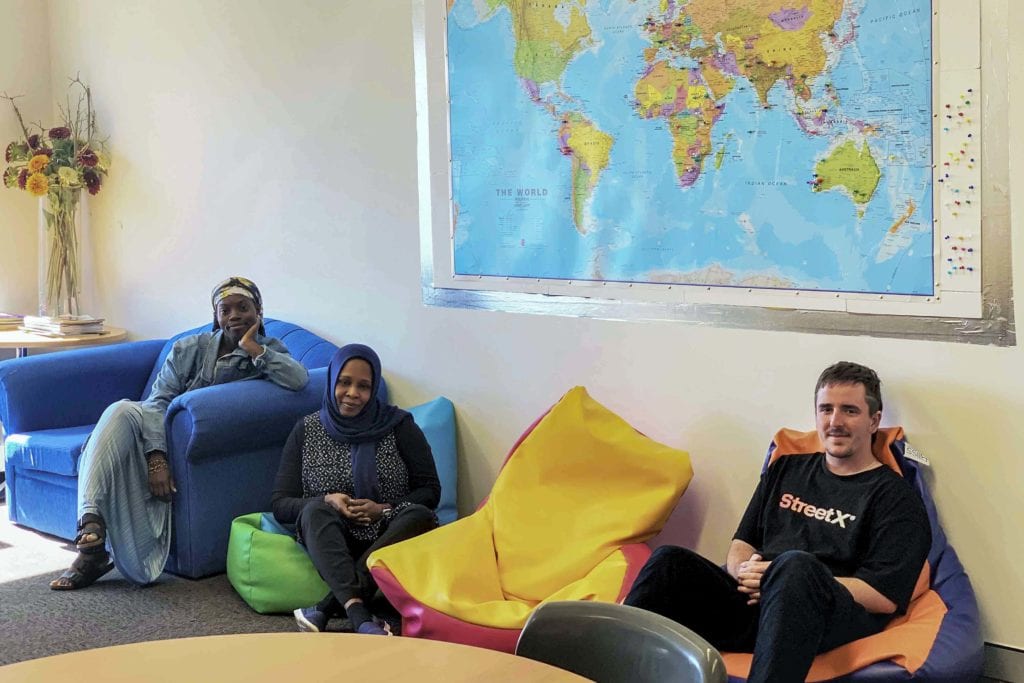
Social distancing making the traditional classroom an operational hazard has been both an opportunity and a challenge for Archdiocesan agency, Centacare Employment and Training.
The not-for-profit training organisation offers programs, courses and support services specifically to disadvantaged members of the community who are looking to learn new skills.
This is the first time that its operations have been so significantly affected by an external threat such as the pandemic.
Centacare Employment and Training Chief Executive Officer, Lee-Anne Phillips, said the global crisis has introduced a wave of digitalisation in the education sector and the organisation was forced to re-assess how they continue to deliver courses effectively while keeping their students engaged.
“Although this global crisis has affected the way we operate our business, it has also opened-up opportunities to discover new possibilities to do things differently,” Mrs Phillips said.
“Bringing digital platforms into our course delivery has proved highly successful and we will continue to learn and move forward.
“One of the challenges was that not all students would have access to a device or internet connectivity. As such the transition to fully online learning was not going to work for everyone,” she said.
“To cater to every student, we offered flexible study options that are tailored to individual students’ needs.”
Mrs Phillips shared that Centacare’s staff proved creative, innovative and supportive of the changes that emerged and rose to the challenge, coming up with their own ideas of how to support the students throughout this unprecedented time.
She went on to explain that during the crisis, a decision was made to ensure that all Centacare Employment and Training sites remained open for access by job seekers and while classes proceeded as per usual, strict precautions and actions were taken to prioritise the wellbeing of students and staff.
“Our Vocational Education and Training (VET) courses, have been adopted for live streaming face-to-face classes via Zoom.
“Many students expressed interest to study from home,” she said.
“As such, we quickly moved to developing resources and online learning platforms to support the new delivery.
“We trialed this in the beginning with one class, and when we were confident it was working, we rolled it out to all our classes.
Mrs Philips noted it has been a huge success and explained the organisation may continue with this for students who are unable to attend class.
Centacare’s students include job seekers of all ages from a wide-range of cultural backgrounds, coming together in a multicultural student population including youth and mature-age students, migrants and refugees, indigenous and non-indigenous Australians.
As such, the student body is comprised of a mix of the most vulnerable, those most likely to have come into contact with someone who has travelled internationally and people who may be more susceptible to the economic impacts of government restrictions.
Also, the agency’s Perth training courses and employment programs are delivered from several locations, including its head office in West Perth and other training sites in Joondalup, Cannington, Gosnells, Fremantle, and Armadale.
Centacare trainers and teachers carried out an extensive routine of cleaning and wiping down all high touch areas, including tables, chairs, monitor screens, keyboards and doorknobs; and social distancing measures were increased internally to two-square metres of separation and a limit was placed on the number of students in each classroom.
To help stop the spread of COVID-19, students were required to practice personal preventative measures, with students who have been overseas on or after 16 March, were experiencing any flu-like symptoms (including, cough, sore throat, fever and/or shortness of breath), or had been in contact with a confirmed case of COVID-19, practicing mandatory self-isolation at home to prevent the possible spread of the virus to other people.
“As more restrictions ease, we plan to shift our courses and programs back to fully face-to-face learning, but online students will still be able to continue the online study until the end of their course duration,” Mrs Phillips said.
“Even as we gradually transition back to pre-COVID operations, we will continue to encourage good hygiene practices across all our training sites and offering flexible study options as we ease into a new normal.
This week, Western Australia saw the number of cases of people with COVID-19 rise to 553, with the WA Department of Health reporting seven active cases as at 11pm on Tuesday 12 May.
The Australian total has now risen to 6,964.
According to the Department of Health, of those cases, 97 have died (including nine West Australians) and 6,229 have been reported as recovered from COVID-19 (of which 537 have recovered in WA).
There are currently just two confirmed COVID-19 patients in Perth metropolitan hospitals, with one of those patients in ICU.
As of Wednesday 13 May, 56,226 Western Australians have tested negative for COVID-19.